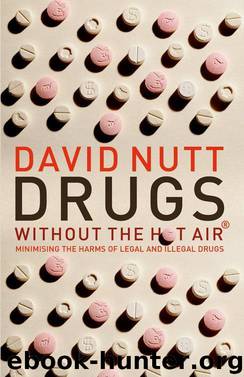Drugs Without the Hot Air: Minimising the Harms of Legal and Illegal Drugs by David Nutt

Author:David Nutt [David Nutt]
Language: eng
Format: epub
ISBN: 1906860165
Publisher: UIT Cambridge Ltd.
Published: 2012-09-02T00:00:00+00:00
Psychological treatments
Psychological treatments try to help people understand how and why their addiction began, and use that understanding to avoid relapse or reduce harm. Probably the best known psychological treatment is the 12-step programme, which began with Alcoholics Anonymous but now has branches for everything from methamphetamine addiction to “emotional dependence”. The programme helps people towards abstinence by taking them through a highly-structured process for rebuilding their lives, including making amends to those they’ve hurt through their addiction. Alcoholics Anonymous was begun by Christians, and although 12-step groups are not officially Christian organisations, they do use religious terminology, referring to a “higher power” which can help those who feel powerless over their compulsion to resist cravings. Whether or not anything supernatural is going on, this approach is clearly helpful to some people, (and more generally, being religious is protective against addiction).
There are also branches attached to many “anonymous” groups for the friends and families of addicts, and going through the process together can help everyone to re-establish contact and rebuild trust. The programme views addiction as a lifelong illness, but one which it is possible to resist through social support and willpower. The programme’s focus on abstinence, however, can alienate those who find they cannot avoid relapse, sending them back into chaos if they fail to stay “clean”.
A different psychological treatment is cognitive behavioural therapy (CBT). CBT identifies the internal, mental, social and environmental triggers that lead to drug taking, and develops coping strategies to avoid triggers leading to relapse. Some of the skills learned are practical – for example avoiding certain places and situations; others are internal – such as managing cravings by trying to remember the negative effects of the drug; and others are interpersonal – such as learning to say “no” convincingly to offers of drugs or alcohol. The addict learns to plan how to handle stressful situations and emergencies, and the possibility of “failure” is incorporated into the recovery plan. By preparing psychologically for the challenges the addict will inevitably face, it is hoped they will establish better coping mechanisms than by relying on willpower alone.
Other common psychological treatments include individual, couples or family therapy, where the environmental causes of the addiction can be discussed and dealt with. If the environment doesn’t change, treatment is unlikely to work: for example, if someone is drinking to cope with a violent partner or family member, they are unlikely to stop while they remain in the abusive situation. Alternative sources of enjoyment are encouraged, such as taking up a sport or looking after a pet. Engaging in helping others with addiction is also a popular way of keeping off alcohol or drugs.
When people have multiple complex problems like this, practical support is an essential part of treatment. For most “problem drug users”, their addiction is just one of a catalogue of difficulties in their lives, which they struggle with alongside a mixture of mental and physical health problems, extreme poverty and homelessness, social isolation and periods in and out of prison.
Download
This site does not store any files on its server. We only index and link to content provided by other sites. Please contact the content providers to delete copyright contents if any and email us, we'll remove relevant links or contents immediately.
The Hacking of the American Mind by Robert H. Lustig(4358)
Right Here, Right Now by Georgia Beers(4192)
Fingerprints of the Gods by Graham Hancock(3981)
Goodbye Paradise(3793)
Bad Pharma by Ben Goldacre(3414)
Happiness by Matthieu Ricard(3035)
More Language of Letting Go: 366 New Daily Meditations by Melody Beattie(3016)
The Social Psychology of Inequality by Unknown(3011)
The Plant Paradox by Dr. Steven R. Gundry M.D(2599)
Drugs Unlimited by Mike Power(2583)
Confessions of a Shopaholic by Sophie Kinsella(2337)
Borders by unknow(2300)
Make Love Not Porn by Cindy Gallop(2094)
Dry by Augusten Burroughs(2090)
Stop Being Mean to Yourself: A Story About Finding the True Meaning of Self-Love by Melody Beattie(1981)
Getting Off by Erica Garza(1926)
Belonging by Unknown(1847)
Yoga and the Twelve-Step Path by Kyczy Hawk(1830)
Unmasking Male Depression by Archibald D. Hart(1797)
